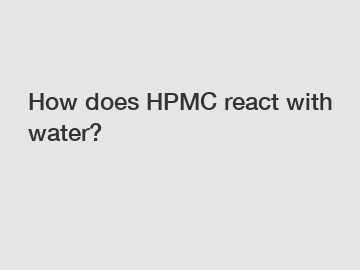How does HPMC react with water?
How does HPMC react with water?
HPMC, also known as Hydroxypropyl Methylcellulose, is a widely used cellulose-based compound in various industries. It is notable for its unique properties, especially its reaction with water. When HPMC comes into contact with water, it undergoes a process called hydration, which leads to significant changes in its physical and chemical properties. This reaction plays a crucial role in various applications of HPMC and has important implications in the pharmaceutical, construction, and food industries.
Hydration is the process by which HPMC absorbs water and forms a gel-like substance. This reaction occurs due to the presence of hydrophilic hydroxyl groups and hydrophobic methyl groups in the HPMC molecule. When HPMC is exposed to water, the hydrophilic hydroxyl groups attract and bind with water molecules through hydrogen bonding, resulting in the formation of a gel-like network structure. The hydrophobic methyl groups, on the other hand, repel the water molecules, contributing to the stability and viscosity of the gel.

The hydration behavior of HPMC has been extensively studied and characterized using various techniques, such as thermogravimetric analysis, nuclear magnetic resonance spectroscopy, and microscopy. These studies have provided insights into the mechanism and kinetics of the hydration process. Additionally, the degree of hydration, which is determined by factors such as temperature, pH, and concentration of HPMC, affects the gelation behavior and functional properties of the HPMC-water system.
The significance of understanding how HPMC reacts with water lies in its wide-ranging applications. In the pharmaceutical industry, HPMC is commonly used as a binder, film-former, and sustained-release agent in tablet formulations. The hydration process of HPMC is crucial for the dissolution and release of active pharmaceutical ingredients, ensuring the desired drug delivery profiles and bioavailability. Moreover, the gelation properties of HPMC also contribute to the viscoelasticity and mucoadhesive properties of drug delivery systems.
In the construction industry, HPMC is widely employed as a thickener, binder, and water-retention agent in cement-based materials. The hydration behavior of HPMC enables it to improve the workability, consistency, and setting time of cementitious systems. The gelation of HPMC in water forms a protective film around cement particles, preventing water loss and enhancing the durability and strength of the final product.
In the food industry, HPMC acts as a stabilizer, emulsifier, and texture modifier, among other functions. By understanding its reaction with water, food technologists can manipulate the gelation behavior of HPMC to improve the texture, stability, and sensory attributes of various food products. The ability of HPMC to form gels with water also offers opportunities for creating innovative food structures and unique eating experiences.
In conclusion, HPMC exhibits a distinctive reaction with water through the process of hydration, resulting in the formation of a gel-like substance. This reaction is attributed to the hydrophilic and hydrophobic nature of HPMC, and its dynamics have been extensively studied. Understanding how HPMC reacts with water is crucial for its applications in the pharmaceutical, construction, and food industries, as it influences important properties such as drug release, cement workability, and food texture. Continual research and exploration of HPMC-water interactions will further broaden our understanding and enhance the utilization of this versatile compound.
For more HPMC for tile bond materials, China HPMC, hydroxypropyl starch ether manufacturerinformation, please contact us. We will provide professional answers.
40
0
0

Comments
All Comments (0)